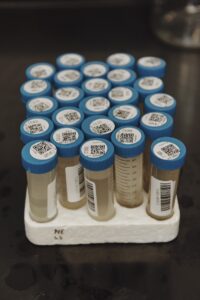Who is a member?
Our members are the local governments of Massachusetts and their elected and appointed leadership.

The town of Nantucket is working with Cambridge-based Biobot Analytics to test wastewater for evidence of high-risk substance use and several respiratory illnesses. (Photo courtesy Biobot Analytics)
Hoping to detect public health problems before they escalate, Nantucket has expanded its wastewater testing to find signs of illegal drug activity, nicotine use, and respiratory illnesses beyond COVID.
In late June, Nantucket began testing its wastewater for traces of illegal drugs including cocaine, fentanyl and other opioids, methamphetamine, and xylazine (also known as “tranq”). It has also begun monitoring for flu and RSV, as well as nicotine. The new testing builds on the existing COVID wastewater surveillance that the town has been conducting with Cambridge-based Biobot Analytics since 2022.
Town officials said that the increased wastewater testing will help inform their policymaking around substance abuse and respiratory illnesses, respond to emerging problems in real time, provide more detailed information to health care providers working on the front lines, and help guide decisions around funding and grant opportunities.
“Over the past few decades, overdose deaths have risen at alarming rates,” said Roque Miramontes, Nantucket’s public health director. “No community is immune, including small and rural towns. And on Nantucket, we are an island 20 miles out to sea, and although we are relatively small in population, that number grows by a factor of four in the summer, with the addition of seasonal residents and vacationers.”
During the peak tourism season, Nantucket’s population expands to about 80,000. Miramontes said the wastewater testing data can help the town better understand the fluctuations in substance-use levels through different times of the year, including the off-season.
Because of the existing partnership with Biobot, Miramontes said the expanded testing has gone seamlessly so far. Nantucket had already found success using its COVID wastewater surveillance to prevent larger illness outbreaks. Early this summer, for example, the town saw increased COVID in the wastewater and was able to alert the local hospital ahead of the two-week surge of cases that followed.
The town saw similar possibilities for the other illnesses, and particularly for substance use, Miramontes said, especially given the opioid crisis that has devastated so many communities.
The town budgeted $30,000 this fiscal year to cover the expanded testing. The COVID wastewater testing already in progress was funded by the state, he said.
Town Manager C. Elizabeth Gibson said such testing can help municipalities better understand their own health needs.
“This is a non-invasive, fairly inexpensive way of testing for, measuring and monitoring a variety of substances that could be impacting the health of your community,” Gibson said, “which can help determine if you have a problem that needs to be explored further or addressed.”
Marisa Donnelly, Biobot’s epidemiology director, said the company is working with more than 100 locations nationwide to monitor for high-risk substances in wastewater, including four in Massachusetts. She said the company isn’t able to disclose the three other testing locations in the state, but she commended Nantucket officials for their work in this area.
“Nantucket is one of the most forward-thinking communities in their use of wastewater monitoring to track trends in opioid use and other substances,” Donnelly said.
Once a week, Nantucket auto-samples the wastewater every hour over a 24-hour period, Miramontes said, and sends the composite samples to Biobot’s lab, which analyzes them and sends back the data. The whole process takes four days, Donnelly said.
The wastewater samples are taken from the town’s wastewater treatment plant, which services roughly 70% of the island, Miramontes said. He said the testing area reflects a good representation of the community for analysis purposes.
“We believe that doing this activity represents a good use of our finite resources,” he said.